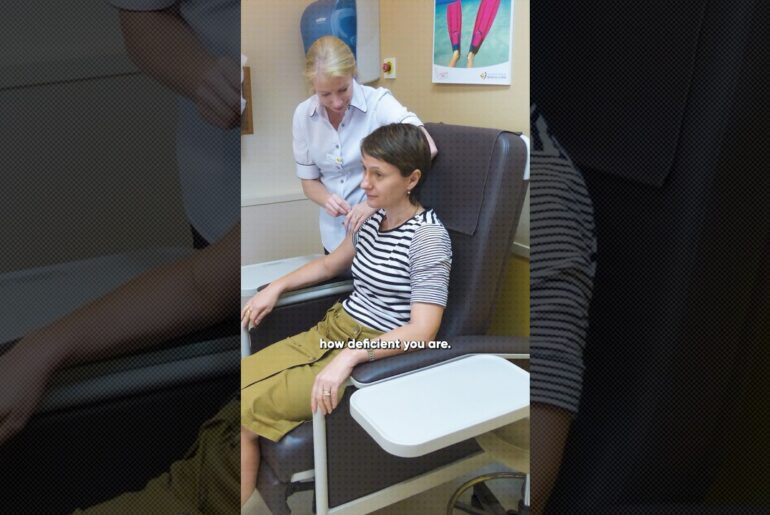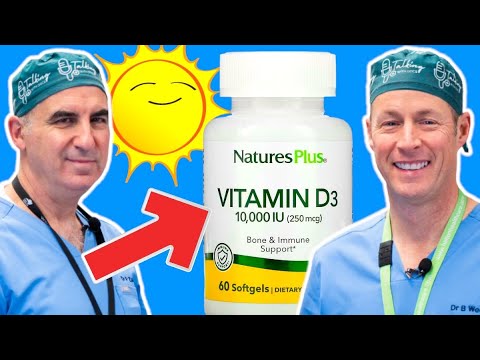KINDLE BOOK LINK: https://www.amazon.com/MIRACULOUS-RESULTS-EXTREMELY-SUNSHINE-EXPERIMENT-ebook/dp/B005FCKN2S
Autoimmune diseases have become increasingly common. Find out about the #1 nutrient deficiency related to this issue.
0:00 Introduction: #1 vitamin deficiency related to autoimmune diseases
0:48 Parathyroid hormone and calcium
3:18 The Coimbra protocol
3:35 Vitamin D resistance
6:05 How to prevent high calcium levels in the blood
In this video, we’re going to talk about the critical roles of vitamin D and parathyroid hormone in helping to prevent autoimmune diseases. Many people with an autoimmune disease have had success with the Coimbra protocol, which involves taking high doses of vitamin D.
The Coimbra protocol checks parathyroid hormone levels produced by the parathyroid gland, which is intimately involved in calcium regulation. If you have low calcium, the parathyroid gland pulls calcium from your bones and distributes it into the blood. Vitamin D helps with the absorption of calcium by a factor of 20x!
Vitamin D resistance occurs when the body does not absorb vitamin D. You can have normal vitamin D levels in the blood yet still be deficient in vitamin D. Parathyroid hormone levels can tell you if that’s happening.
If you are not getting enough vitamin D, you will have trouble with calcium absorption. The parathyroid gland will have to overcompensate to combat vitamin D resistance.
Usually, if you have high vitamin D, you’ll have low parathyroid hormone levels. Low vitamin D and high parathyroid hormone levels can signify vitamin D resistance.
If you have vitamin D resistance, the solution is to take more vitamin D! The Coimbra protocol involves adjusting vitamin D until the parathyroid hormone lowers to a low to normal level.
Vitamin D resistance is typically caused by a problem with vitamin D receptors or a genetic issue known as polymorphism.
Other barriers to vitamin D absorption include:
• Low sun exposure
• Darker skin complexions
• Old age
• High stress
• Location
• Air pollution
Pathogens have strategic methods of downgrading vitamin D receptors. Pathogens from tick bites can downgrade your receptors by a factor of 60x!
Cancer cells, especially those affecting the colon and bones, downgrade vitamin D receptors to survive. Heavy metals can also downgrade vitamin D receptors.
Magnesium and zinc can protect against high calcium levels in the blood, but your best defense is vitamin K2.
Dr. Eric Berg DC Bio:
Dr. Berg, age 58, is a chiropractor who specializes in Healthy Ketosis & Intermittent Fasting. He is the author of the best-selling book “The Healthy Keto Plan” and is the Director of Dr. Berg Nutritionals. He no longer practices, but focuses on health education through social media.
Follow Me On Social Media:
Facebook: https://bit.ly/FB-DrBerg
Instagram: https://bit.ly/IG-DrBerg
Anchor: https://bit.ly/Anchor-DrBerg
TikTok: https://bit.ly/TikTok-DrBerg
Disclaimer:
Dr. Eric Berg received his Doctor of Chiropractic degree from Palmer College of Chiropractic in 1988. His use of “doctor” or “Dr.” in relation to himself solely refers to that degree. Dr. Berg is a licensed chiropractor in Virginia, California, and Louisiana, but he no longer practices chiropractic in any state and does not see patients so he can focus on educating people as a full-time activity, yet he maintains an active license. This video is for general informational purposes only. It should not be used to self-diagnose and it is not a substitute for a medical exam, cure, treatment, diagnosis, prescription, or recommendation. It does not create a doctor-patient relationship between Dr. Berg and you. You should not make any change in your health regimen or diet before first consulting a physician and obtaining a medical exam, diagnosis, and recommendation. Always seek the advice of a physician or other qualified health provider with any questions you may have regarding a medical condition.
#keto #ketodiet #weightloss #ketolifestyle
Thanks for watching! I hope this helps you better understand the role of vitamin D and parathyroid hormone in autoimmune diseases. I’ll see you in the next video.
So I have a very important video today talking about autoimmune diseases and the most important vitamin deficiency related to this condition and answer a lot of important questions that people have first of all how do we know if we’re getting enough vitamin D and how are we going to deal with the toxicity
Factor with vitamin D and so I have some really good solutions to all of the questions and the problems that come up with uh dealing with vitamin D in relationship to autoimmune diseases now if you’re not already familiar with the coimbra protocol okay that was developed
By a doctor in Brazil you need to put this on your radar because a lot of people are getting amazing results by using his high vitamin D protocol however there’s something very very important that I’m going to simplify for you in relationship to this problem this
Is why he checks a hormone called the parathyroid hormone the parathyroid gland produces the parathyroid hormone which has everything to do with regulating your calcium if there’s low calcium in the body parathyroid gland is going to rob calcium from your bone and put it into the blood now what does
Vitamin D have to do with it well vitamin D helps the absorption of calcium by a factor of 20x okay so it helps you absorb a lot of calcium in your bloodstream but you have something called vitamin D resistance that means that you can be taking
Vitamin D but it’s not going into the body so we really have to step away from just this calcium regulation because it controls a lot of different factors as far as this parathyroid hormone okay what it actually does it tells us if vitamin D is working biologically in
Your cells you can have normal amounts of vitamin D in your blood yet be very deficient in vitamin D and the parathyroid hormone will tell you if that’s happening if you’re not getting sufficient amounts of vitamin D you’re going to have problems with calcium absorption and the pariy gland is going
To have to overcompensate to overcome this vitamin D resistance and so we look at your vitamin D levels we look at the parathyroid hormone okay we want to look at the relationship between both of them because normally if you have high vitamin D you should have low
Parathyroid hormone or if you have low vitamin D in your blood you should have high parathyroid hormone it’s important to know that the parathyroid hormone also helps in the conversion of the inactive vitamin D to the active vitamin D as it relates to your kidneys and the
Liver you’re going to have vitamin D resistance and one way to pick this up is by testing the par par thyroid hormone and really understanding what a high level means and what a low level means you’re getting sufficient amount of vitamin D because you check the blood but your parathyroid hormone is high
Suspect you have vitamin D resistance okay now how are we going to fix that well you’re going to have to take more vitamin D and this coimbra protocol has everything to do with adjusting your vitamin D increasing it to the point where your parathyroid hormone starts to
Come down to like a low Normal area and that means that you’re getting the biological effect of vitamin D but the big question is what is up with this vitamin D resistance how do we develop it and what is it typically it has to do with the vitamin D receptor but it can
Also be in the lack of conversion from the inactive to the active vitamin D because there’s some genetic issue which by the way is very very common the term for this genetic problem is called polymorphism I’ve tested 25 people in relation ship to vitamin D and every
Single one of them had at least one problem with a genetic issue with vitamin D and of course on top of everything else you also have a lot of other barriers of getting vitamin D right people don’t go on the sun uh the darker your skin uh the less vitamin D
You’re going to absorb from the Sun uh the older you are the less you’re going to absorb the more stress that you have the more vitamin D you’re going to need and also the things that go along with it like the absorption of calcium this is why one of the side effects is
Osteoporosis and then of course you have where you live let’s say you live in the North right where you don’t get as much sun I mean just think about the fact that the closer you are to the Equator the less autoimmune diseases you have the more pollution you have in the
Environment in the sky the less vitamin D you’re going to have then we get into this interesting topic of pathogens all will have strategic effects of downgrading your vitamin D receptor and your immune system doesn’t get the Vitamin D it needs to defend against these pathogens they’re very very sneaky
Then you get another pathogen which is the pathogen that comes from a tick bite do you realize that that microorganism will downgrade your vitamin D receptor by 60x all these people with Lyme disease they are so deficient in vitamin D then you get cancer cells especially
Of the colon and of your bone they also downgrade The receptors for vitamin D so they can survive there’s also something else I want to share with you it’s a toxin from bacteria and you see this in like systemic infections you’ll see it when someone detoxifies then you also have like other
Heavy metals that can also downgrade and make the vitamin D receptor less receptive now I hope this is as interesting to you as it is to me because I think it’s actually quite fascinating to understand the mechanism to understand there’s such a thing as Vitamin D resistance and the way that
We’re going to overcome it is by taking more vitamin D and the way we’ll really know that it’s working is to look at this parathyroid hormone but let’s say we want to protect ourselves against this calcium in the blood that’s too high well there are several ways you can
Do it okay you can do with magnesium you can do it with zinc which are co-actors but the biggest protector of this excess calcium in the blood is vitamin K2 this is why I never recommend taking vitamin D without K2 now usually you would need about 100 micrograms of K2 for every
10,000 iuse of vitamin D and they were taking vitamin K2 in super high amounts seeing amazing results to overcome osteoporosis so instead of taking micrograms they weren’t taking like 45 micrograms of vitamin K2 they were taking 45 milligrams of vitamin K2 which is a lot more I’m just putting this on
Your radar because let’s say for example you have calcium in your arteries or you have a kidney stone or you have hypercalcemia or you have arthritis where you have too much calcium in the joints you might want to beef up your vitamin K2 to the levels of milligrams
Not micrograms and some of the information I’m talking about is based on this amazing Kindle book that I just read twice okay because I couldn’t stop reading it this author has a very interesting way of writing that makes it easy to understand which I appreciate and I highly recommend you also check
Out that book I’m going to put a link down below so thanks for watching and I will see you in the next video


![Why MOST Take Calcium & Vitamin D Wrong! [2024 Studies Update]](https://www.vitaminrush.com/wp-content/uploads/2024/04/1714233431_maxresdefault-770x515.jpg)



